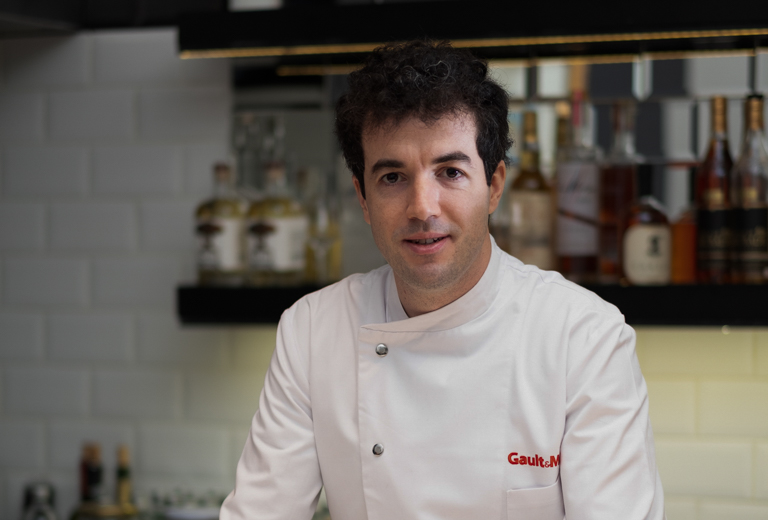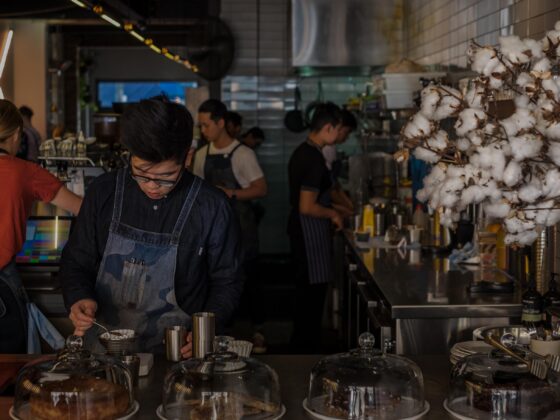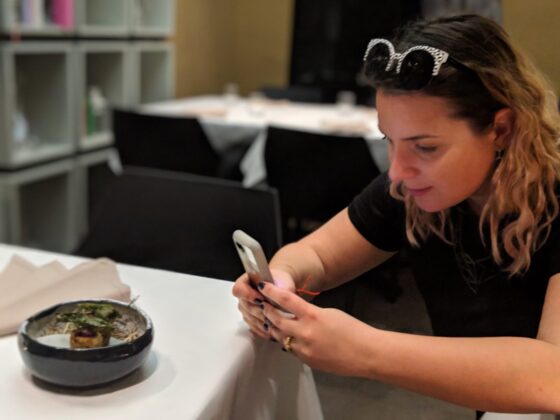At only 28, Chef Alex Dumitru is one of Romania’s most promising chefs. He is also the winner of the Gault&MIllau Terroir award for his collaboration with local producers. Read about his adventures abroad, and why he came back to his home country. Find out more about his opinions on Romanian food and terroir, as well as culinary voice.
Chef Alex Dumitru’s beginnings
Alex’s story starts on his grandparents’ farm in Prahova county, Romania. He was lucky enough to have a family that valued all things homemade.
‘I was raised in a simple countryside family farm by my maternal grandparents until the age of 7. They had land, animals and a strict routine in making cheese, bread, sausages and others at home.’
His journey as a chef wasn’t intentional, but accidental. When the two cooks at the restaurant Alex was working at had a fight and one got fired, Alex was promoted as a cook.
Later on, his head chef encouraged Alex to pursue culinary school, which he did. To ensure his spot at the HRC Culinary School in Sofia, Alex had to spend a year saving money. He chose a 2 year programme that included housing, and most importantly, internships.
‘Culinary school is great because you get to spend your time with people with whom you share the same goals and chase the same dream. And it’s a great way of starting off.’
The school schedule was tight, and many dropped out. But despite that, Alex kept going. And thanks to this, he got to travel, see new places, meet new people and discover new cultures. All while gaining experience in great kitchens of the world.
So far, Alex has worked for:
– 1975 Steakhouse, French Lick, Indiana
– Les Solistes by Pierre Gagnaire, Berlin, Germany
– Waldorf Astoria, Berlin, Germany
– Talents, Sofia, Bulgaria
– Auberge du Soleil, Napa Valley, California, US
– Atra Doftana, Prahova, Romania
– Bistro Ateneu, Bucharest, Romania
After one and a half years in one of the world’s most prestigious kitchens, Chef Alex Dumitru decided it was time for a new adventure. Japan, UK, Denmark and the like, he thought. But then the thought of returning to Romania sunk in. He started looking for jobs and was sure that he would be a good chef as long as he sticks to his beliefs and work ethic.
‘At that time (2015-2016), the Romanian food scene was quite different compared to today. So I took the challenge and started my professional journey in Romania.’


Romania, its food and its terroir
How is Romania different from California?
Chef Alex Dumitru: The good part is that Romania is developing. At least the restaurant industry is. But we have to progress further to have the same conditions as in California. There, chefs and others in the food industry talk about produce, seasonality, investors, guests, trends, communities, local authorities’ support and infrastructure. This is the big difference between Romania and California. But hopefully in 10 years we can get closer to them than where we stand now.
How does Valea Doftanei differ from Bucharest?
Chef Alex Dumitru: Valea Doftanei provides a lot more produce. Especially wild produce such as mushrooms, fruits, nuts and [breathtaking] landscapes. Bucharest provieds more diversity, and guests with a better culinary education.
What’s Romanian food?
C.A.D.: I honestly think at this point Romanian food isn’t really defined. We live in times of big supermarkets, where your produce is often imported. I don’t see the relationship between this and Romanian food.
Another issue is that people tend to cook less and eat out instead. And they order the same old things, such as ‘ciorba’ or ‘sarmale’, or ‘mici’. Don’t get me wrong, there is nothing wrong in ordering these. But most of the time they’re poorly executed, using poor techniques and ingredients of questionable quality.
I prefer to cook Romanian food in a way that meets my standards, and uses the best ingredients. And to be more particular, I try to focus on produce that is around me and find out where it comes from.

What’s the issue with Romanian food and how should the local cuisine evolve?
C.A.D.: It should become easier to understand how to prepare dishes. And the ingredients should be seasonal. The advantage is that prices are lower, quality is better and the taste is natural. And for an amateur cook, it will be a lot easier to work with fresh, seasonal ingredients.
I believe that the Romanian openness towards food is increasing. You can have sushi, Indian, Mexican, and a variety of Middle Eastern cuisines [in Romania].
But for me, it’s simple: product oriented food, with the least amount of ‘damage’ to the ingredients as possible.
If you could wave a magic hand and change something about Romanian cuisine, what would it be?
C.A.D.: The tendency to overcook food.
What are the most exciting yet underrated ingredients in Romania?
C.A.D.: I am still discovering new ingredients myself. Currently, I would say organs such as liver, tongue, kidneys, tripe.


You, as a chef
Alex loves to stroll through the markets of Bucharest, particularly Obor, Domenii and Matache. He enjoys picking and tasting from various producers. But if there’s one product he’ll like, he will go back to it over and over again.
He admires Thomas Keller for his elegance and technique. He likes the way René Redzepi reinvents the idea of a local cuisine and uses various ingredients. And finally, he’s grateful for Anthony Bourdain’s inside stories about a cook’s life.
He has an enormous collection of cookbooks and struggles to pick his favourite. But he recommends Toothache magazine for its great insights into culinary innovation.
His favourite gadget is a hot stove.
What defines you as a chef?
Chef Alex Dumitru: My cooking style is evolving and I hope it will always be. I am curious about ingredients and techniques, but with a simple, classic approach. I aspire to learn more about the Romanian terroir and make it more affordable for the guests.
How do you create a dish?
C.A.D.: I look at what ingredients I have available in the next 3 months [roughly], then use experience and intuition. I am more of a freestyle type, I do not like to think too much about a certain recipe. I’d rather try it out and see how it turns out and then decide on next steps. And of course, I get inspired by looking at the many, many restaurants and chefs I follow on Instagram, but also talk with fellow chefs and friends.

On work life balance
Alex got married last year, and has just had a baby. But his advice in keeping his mind free of stress is to focus on one thing at a time.
‘I started to realise that family time is really important for my mental state. I like to go home and not think about my work day, but try to focus on completely different things that give me pleasure. A bit of exercise, like swimming, yoga or a run, listening to music, watching a movie, going out for a drink or a show. By doing these I get to be a ‘normal’ guy and the next day I am ready to start fresh again.’
Where to taste Alex’s fantastic food
Alex is the head chef at Bistro Ateneu, in Bucharest. His dishes are a true showcase of local, seasonal and high quality ingredients. As for his culinary style based around simplicity and experimentation take the modern Romanian cuisine to a whole new level. But… how about you follow him on Instagram too?
Want to dive deeper into the evolving culinary world of Bucharest? Check out my interview with Chef Sorin Cucu from Mahala Restaurant.
Photos courtesy of Catalin Olteanu




